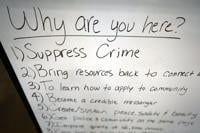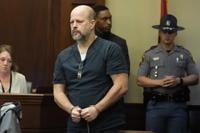HOUSTON (AP) — Political ads on the airwaves and social media in the nation's fourth largest city paint a picture of Houston as a failed state where crime is out of control and violent criminals have free rein.
The political discussion over crime even made its way to the pulpit, with popular megachurch Pastor Ed Young calling Houston “the most dangerous city in America” and telling parishioners that if the city, which is led by Democrats, “is to survive, we had better throw those bums out of office.”
In reality, September statistics showed a 3% drop in homicides and a 10% drop in overall violent crime compared with the same month last year, as Houston Police Chief Troy Finner pointed out at a town hall last month, trying to reassure residents that things are getting better.
But Finner, acknowledging concerns raised at the meeting, noted that crime is still “not where we want it to be.”
The debate in the Houston area mirrors on as violent crime rates appear to have but still sit above pre-pandemic levels. The topic has become an attack line largely by Republican candidates labeling Democrats as soft on crime.
In Harris County, Houston's reliably Democratic home, the top elected official, Democrat Lina Hidalgo, finds herself in a tough reelection bid as her Republican opponent and some in law enforcement blame her policies for crime rates and .
Criminal justice experts say understanding recent crime trends remains challenging, politicization should be avoided, and solutions aren’t simple.
“You can’t hire enough officers to stop the problem that you have in a city. You have to take a holistic approach. You have to get the community involved,” said Howard Henderson, founder of the Center for Justice Research at Texas Southern University in Houston.
Other cities having similar discussions include where officials and civic groups are debating how to combat a surge in violent crime, and , which has struggled to respond to street violence.
In Houston, as elsewhere, the debate has become politicized and sometimes frenzied.
At a Texas legislative committee meeting in Austin this month, Kevin Lawrence, executive director of Texas Municipal Police Association, suggested — without offering evidence — that many Harris County misdemeanor defendants were part of major syndicates seeking to commit more crime.
Ray Hunt, of the Houston Police Officers’ Union, warned at a recent meeting in Houston among officials in Harris County that if more deputies and prosecutors aren't approved, “this county is going to be done.”
The warning came as crime in Houston appears to be trending downward after more than two years of sharp increases during the pandemic and inflationary pressures.
From 2019 to 2021, homicides in the county increased 59%, with most cases in Houston, according to state data. However, other crimes — burglary, robbery and larceny — were down the past two years.
“Pretty much everywhere has seen an increase in murder since 2019,” said Jeff Asher, a crime analyst.
Complicating things has been a county court system overwhelmed by a that began after Houston was hit in 2017 by Hurricane Harvey and was exacerbated by the pandemic.
Mayor Sylvester Turner has touted a holistic approach to crime reduction through the . The $53 million program has provided money for police overtime, mental health services, domestic violence response and gun buybacks.
In August, Texas Comptroller Glenn Hegar accused Harris County officials of violating a state law that prevents the “defunding” of police — a phrase that refers to reallocating some police funds to other priorities that underlie crime, such as mental wellness and unemployment, but that is sometimes misrepresented as abolishing police.
Hegar accused the county of not letting constables roll over unspent funds.
The law — which was passed by the GOP-controlled Legislature and applies to Texas' most populous counties, most of which are led by Democrats — requires officials to hold an election if a budget reduces or reallocates law enforcement funding.
“We need more funding. ... We need boots on the ground,” Harris County Precinct 4 Constable Mark Herman said this month.
Brittany Cheek, 29, said she was grateful county officials last month cleared a plot in her neighborhood of trash and an abandoned mobile home that had become a drug haven. But she’s still concerned about crime.
Residents’ worries shouldn’t be dismissed, Henderson said, but the media and politicians should do a better job of giving the public a correct picture of .
Harris County’s bail reform efforts, part of a ensuring most misdemeanor defendants don’t remain jailed because they are poor, have also been blamed for crime increases.
Brandon Garrett, a law professor at Duke University and one of the monitors of a consent decree that settled the lawsuit, defended Harris County's bail efforts, saying, "You can both protect people’s rights and accomplish public safety at the same time. It’s not a tradeoff.”
Hidalgo said the latest county budget is proposing $100 million in new law enforcement funding. But that budget’s approval is on hold, in part to calls by two Republican commissioners for more officers.
Southeast Houston resident Leroy West, 67, said he’s against slashing police budgets in a way that would endanger public safety.
“I am a proponent of taking some of those funds and addressing social issues, mental health issues. If we deal with it on the front end, police don’t have to get involved on the back end,” West said as he attended a crime prevention workshop last month.
At the town hall with Finner, residents seemed receptive to his reassurances but were still worried.
East Houston resident Lisa Moore told Finner she’s “now taking a pill for anxiety so I can try to sleep at night” after recent shootings near her home.
Finner hugged Moore and promised her and others that their concerns wouldn’t be ignored.
“We got to get you some sleep and some peace,” Finner said.
___
Follow Juan A. Lozano on Twitter:








































